As Sadeq Jafari switched on his electric piano, his students shunted their wheelchairs enthusiastically around him to rehearse new songs.
Music therapy, a common practice in large parts of the world, is extremely rare in Iran, where conservative clerics outlawed pop music after the country’s 1979 Islamic revolution.
Jafari, 33, is one of a handful of therapists in the Islamic state who use music to help severely disabled people find their voices, risking the ire of his conservative family and censure from religious authorities.
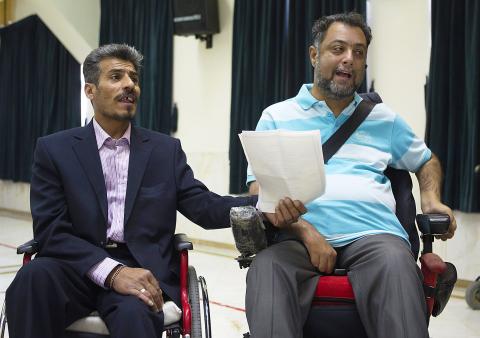
Photo: Reuters
照片:路透
Kahrizak Charity Foundation, in a leafy campus on the outskirts of the capital Tehran, is home to hundreds of physically handicapped people, young and old, who lack financial support.
Each Monday, dozens wait impatiently for Jafari to walk through the door.
Jafari grew up in a religious family which found all forms of music unacceptable. His relatives initially cut ties with him, but their stance softened when they saw the impact of his work on the lives of his patients.
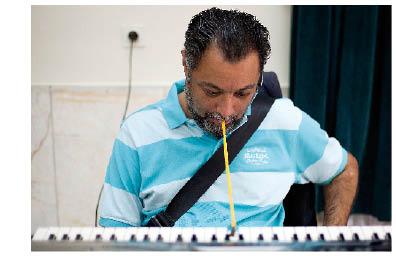
Photo: Reuters
照片:路透
Reza Bakhtiari was paralyzed at six and lost his sight at the age of 30. “It has been three years since I began to attend these classes ... It is like a life skills training,” said Bakhtiari, now 45. “Now that I’ve got the courage, I have published two poetry books.”
It can take up to three months to teach a new song. Jafari also has to overcome cultural barriers, including the shyness of his female students. Many Iranians disapprove of women raising their voices, a problem when it comes to rehearsals.
Iran’s musical restrictions have eased over the past decade and pop music has become increasingly common in some parts of society. But the idea of female artists singing or dancing in front of male audiences is still completely taboo.
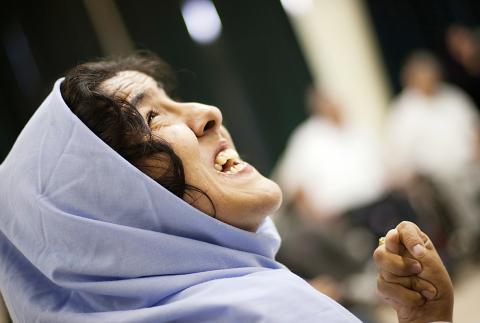
Photo: Reuters
照片:路透
Staff at the center say music does much more than cheer people up. “Music shortens the recovery period since it has a calming effect ... It gives them energy and even alleviates the physical pain,” psychologist Marzieh Alaleh told Reuters.
Jafari uses a lot of traditional Persian folk songs with familiar themes. He describes the changes in his patients as ”tangible.”
(REUTERS)
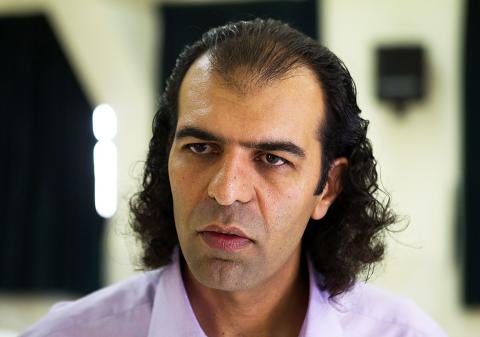
Photo: Reuters
照片:路透
當薩德克‧賈伐瑞開啟電鋼琴開關,他的學生滿腔熱忱地移動他們的輪椅,圍繞賈伐瑞排練新曲。
音樂治療在大多數的國家是稀鬆平常的事,但對伊朗來說,則極為罕見,因該國的保守教長在一九七九年伊斯蘭革命後,使流行音樂成為非法。
三十三歲的賈伐瑞,是伊斯蘭國家中,許多應用音樂幫助重殘人士找回自己聲音的治療師之一,從事此業是冒著可能導致其保守家庭憤怒且被宗教當局譴責的危險。
卡瑞薩克慈善基金會座落在首都德黑蘭外圍林木茂密的地方。此處也是上百位缺乏經濟後盾的老少身障人士的居所。
院內許多人每週一,都會熱切期待等候賈伐瑞的到來。
賈伐瑞在一個不接受任何形式音樂的宗教家庭長大。其親戚原先與他斷絕關係,但當看到賈伐瑞所做所為,帶給其病患生命的影響力,他們原先的立場也隨之鬆動。
現年四十五歲的瑞札‧巴赫地亞里自六歲起就癱瘓,三十歲失明。他說:「我從開始上這些課程迄今已三年…它就像是個生活技能訓練。」他說:「我現在已有勇氣,並且我已出版了兩本詩集。」
教導一首新歌,需要花上長達三個月的時間。賈伐瑞同時也要幫忙克服學生的文化障礙,包含女學生害羞的個性。許多伊朗人不允許女性提高他們的嗓音,這讓排練變得傷腦筋。
伊朗在音樂上的限制已在過去十年間逐漸放寬,流行音樂已在該國某些地區愈趨普及。對於女性藝術家在男性觀眾面前唱歌跳舞,則仍是完全的禁忌。
療養院的員工說,因為音樂不單只讓人們心情變好。心理師馬茲齊耶赫‧阿拉列赫告訴路透說:「音樂因有安撫人心的效果,能縮短復原時程…它給予病患力量,甚至能減輕身體疼痛。」
賈伐瑞運用許多帶有熟悉主題旋律的傳統波斯民謠。他表示病患的轉變,是「有目共睹的」。
(路透/翻譯:林亞蒂)

★ Bilingual Story is a fictionalized account. 雙語故事部分內容純屬虛構。 “Get in. It’s pouring.” She slid into the back seat, drenched and silent. “Tissues?” the driver asked. “No, thank you,” she said. Water beaded off her hair, ran from her coat, and made a small lake on the vinyl. She kept her head down, long black strands clinging to her face. “Where to?” She gave an address. “Funeral?” he asked as they slipped into the Xinhai Tunnel, rain fading to a hollow drum. She glanced up, puzzled. “No. Why?” “Crematorium’s about the only thing here.” He caught her eyes in the mirror.

If you think you’re cool and know all the latest trends, then here’s a question for you: What does the word “brat” mean? If you said something like, “a child who behaves badly or is annoying or rude,” you might not be as hip as you think. This four-letter word now has a new definition that has become quite popular. Its popularity caught the eye of Collins Dictionary, which crowned it as “Word of the Year 2024.” According to this new meaning of brat, it is used as an adjective to describe someone who has a confident, independent, and hedonistic
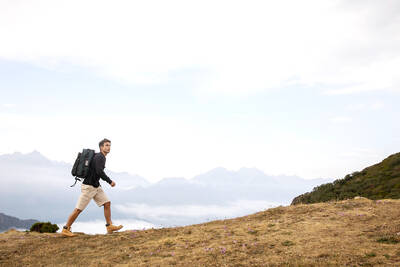
Have you ever dreamed of hiking Taiwan’s majestic Mt. Jade or visiting Peru’s breathtaking Machu Picchu? These adventures sound amazing, but there’s something you should know about first: “altitude sickness.” This condition strikes when you climb to a higher elevation too quickly. The higher you go, the thinner the air becomes, making it harder for your body to absorb oxygen. The symptoms usually begin within hours of reaching high altitudes — about 2,500 meters or higher. You might experience headaches, dizziness, nausea, shortness of breath, or extreme fatigue. These symptoms can last for several days. The severity of altitude sickness varies

Week 24 詞法—名詞 1. 人們一致稱讚他。 ˇ People praised him unanimously. χ Peoples praised him unanimously. 註:people 作「人們」(= men and women)解時,是單數形式,作複數用。peoples 是「多個民族」、「各國人民」,不是「多數人」,如 the peoples of Asia(亞洲各民族、亞洲人民)。 2. 她為他做了一條新褲子。 ˇ She made him a new pair of trousers. χ She made him a new trousers. 註:scissors 和 trousers 等名詞習慣用複數形式。「一把剪刀」或「一條褲子」正統說法為 a pair of scissors 或 a pair of trousers。 3. 我們提前兩年完成了第二個五年計劃的主要目標。 ˇ We fulfilled the major objectives of the Second Five-Year Plan two years ahead. χ We fulfilled the major objectives of the Second Five-Years Plan two years ahead. 註:five-year 作為一個複合形容詞,year 不用複數。又如 a twelve-year-old boy、a five-dollar note、a one-hundred-meter race 等,也是一樣。 4. 他們決定買一輛新車。 ˇ They have made up their minds to buy a new car. χ